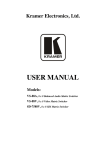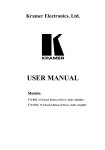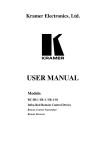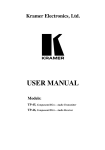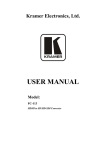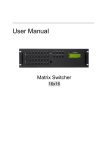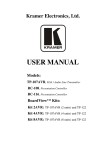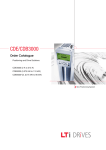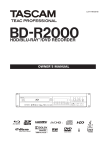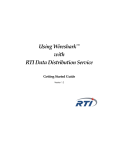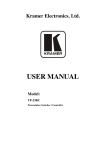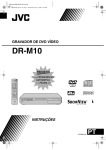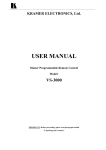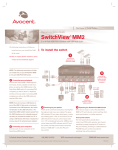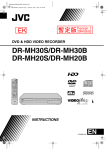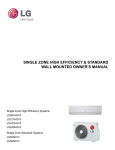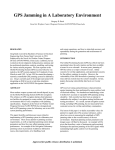Download VS-88A, VS-88V, SD-7588A, SD-7588V, RC-8000
Transcript
Kramer Electronics, Ltd. USER MANUAL Models: VS-88A, VS-88V, SD-7588A, SD-7588V, RC-8000 88 Series Contents Contents 1 2 3 3.1 3.2 4 4.1 4.2 4.3 4.4 4.5 5 6 6.1 6.2 6.3 6.4 6.5 7 7.1 Introduction Getting Started Overview The 88 Series High Quality Performance Recommendations Your Matrix Switchers Your VS-88A 8x8 Balanced Audio Matrix Switcher Your VS-88V 8x8 Video Matrix Switcher Your SD-7588A 8x8 Digital Audio Matrix Switcher Your SD-7588V 8x8 SDI Matrix Switcher Your RC-8000 Remote Controller Installing in a Rack Connecting Your Matrix Switchers Dipswitch Settings Connecting a Standalone Unit Connecting Several Units with/without the Remote Controller Connecting Several Units and the PC Connecting a Component, Y/C, RGBS or RGBHV Switcher Understanding the Modes About the System Modes 1 1 2 2 2 3 3 6 9 12 15 18 19 19 20 20 22 23 24 24 7.1.1 7.1.2 Standalone Mode IN SYSTEM Mode 24 24 7.2 About the Confirmation Modes 24 7.2.1 7.2.2 AT ONCE Mode CONFIRM Mode 25 25 8 8.1 Operation Technical Information 26 26 8.1.1 8.1.2 8.1.3 8.1.4 Setup Capacity Switching the Power On Timeout System Settings Priority 26 26 26 27 8.2 Push Button Controls 27 8.2.1 8.2.2 8.2.3 Storing a Setting Recalling a Setting Locking and Unlocking Settings 27 27 28 9 Technical Specifications 30 i Contents Figures Figure 1: VS-88A 8x8 Balanced Audio Matrix Switcher Figure 2: VS-88V 8x8 Video Matrix Switcher Figure 3: SD-7588A 8x8 Digital Audio Matrix Switcher Figure 4: SD-7588V 8x8 SDI Matrix Switcher Figure 5: RC-8000 Remote Controller Figure 6: Rear Panel Dipswitches Figure 7: RS-485 System Connection: Switchers and Remote Controllers Figure 8: System Connection: Switchers and the PC Figure 9: Component Switcher: VS-88V Group Connection 4 7 10 13 16 19 21 22 23 Tables Table 1: VS-88A 8x8 Balanced Audio Matrix Switcher Features Table 2: VS-88V 8x8 Video Matrix Switcher Features Table 3: SD-7588A 8x8 Digital Audio Matrix Switcher Features Table 4: SD-7588V 8x8 SDI Matrix Switcher Features Table 5: RC-8000 Remote Controller Top Panel Features Table 6: RC-8000 Remote Controller Rear Panel Features Table 7: Rear Panel Dipswitches Table 8: Machine # Dipswitch Settings Table 9: Push Button Sequence Summary Table 10: Technical Specifications for 88 Series ii 5 8 11 14 17 17 19 19 30 31 KRAMER: SIMPLE CREATIVE TECHNOLOGY Introduction 1 Introduction Welcome to Kramer Electronics! Since 1981, Kramer Electronics has been providing a world of unique, creative, and affordable solutions to the vast range of problems that confront the video, audio, presentation, and broadcasting professional on a daily basis. In recent years, we have redesigned and upgraded most of our line, making the best even better! Our 500-plus different models now appear in eight groups1 that are clearly defined by function. Congratulations on purchasing your Kramer 88 Series switcher: VS-88A, VS-88V, SD-7588A, and/or SD-7588V, and/or RC-8000 Remote Controller. These products are ideal for: Broadcast studios for on-air switching and signal routing Production studios, for connecting various sources to acceptors Non-linear editing suites and presentation applications Each switcher package also includes the following items: Power cord Windows®-based Kramer control software2 This user manual3 2 Getting Started We recommend that you: Unpack the equipment carefully and save the original box and packaging materials for possible future shipment Review the contents of this user manual Use Kramer high performance high resolution cables4 1 GROUP 1: Distribution Amplifiers; GROUP 2: Video and Audio Switchers, Matrix Switchers and Controllers; GROUP 3: Video, Audio, VGA/XGA Processors; GROUP 4: Interfaces and Sync Processors; GROUP 5: Twisted Pair Interfaces; GROUP 6: Accessories and Rack Adapters; GROUP 7: Scan Converters and Scalers; and GROUP 8: Cables and Connectors 2 Downloadable from our Web site at http://www.kramerelectronics.com 3 Download up-to-date Kramer user manuals from the Internet at this URL: http://www.kramerelectronics.com 4 The complete list of Kramer cables is on our Web site at http://www.kramerelectronics.com 1 Overview 3 Overview The 88 Series is a group of 8x8 Vertical Interval Matrix Switchers1 and a Remote Control Panel for video/stereo audio/data signals that support the simultaneous connection of one or more inputs to several outputs2. Vertical Interval Switching3 ensures an undisturbed picture transition. The major innovation with the 88 Series is the ability to switch different kinds of signals simultaneously. Section 3.1 outlines the 88 Series and section 3.2 includes recommendations for achieving high quality performance. 3.1 The 88 Series The 88 Series includes the following items: VS-88A (stereo audio matrix switcher for analog balanced audio) VS-88V (video matrix switcher for analog composite video) SD-7588A (audio matrix switcher for digital audio) SD-7588V (video matrix switcher for digital video) RC-8000 (remote controller for use with the switchers) 3.2 High Quality Performance Recommendations Achieving high quality performance means: Connecting only good quality connection cables, thus avoiding interference, deterioration in signal quality due to poor matching, and elevated noise levels (often associated with low quality cables) Using good quality sockets and connectors for the sources and acceptors to avoid signal path breaks4. Aim for Zero Ohm connection resistance and ensure that sockets and connectors match the required impedance (75 ohms in video) Avoiding interference from neighboring electrical appliances that may adversely influence signal quality. Install unbalanced audio and video lines5 (even though the cables are shielded) away from mains carrying cables, electric motors, and transmitters 1 Switching is implemented during the vertical interval period according to the SMPTE RP-168 standard, when using synchronized SDI sources 2 However, you cannot connect two or more inputs to a single output 3 Frequently used when recording or transmitting a video program involving several video sources 4 Poor quality connectors tend to rust, which may cause breaks 5 Balanced audio lines are less prone to interference 2 KRAMER: SIMPLE CREATIVE TECHNOLOGY Your Matrix Switchers Positioning the switcher correctly. Each switcher is housed in a professional 19-inch rack mountable enclosure, requiring one vertical rack space per product1. The standard 19-inch (IU) EIA rack assembly requires no specific spacing above or below the unit for ventilation 4 Your Matrix Switchers This section describes the products2 in the 88 Series range that can function separately3 or switch together in the same manner in the In System mode4. 4.1 Your VS-88A 8x8 Balanced Audio Matrix Switcher The VS-88A is a high performance 8x8 stereo audio matrix switcher for balanced audio stereo signals using detachable terminal block connectors. In addition, the VS-88A: Is a true matrix switcher, enabling the user to simultaneously route any input to any or all outputs Delivers excellent audio performance ensuring that it remains transparent in almost any audio application Is controllable via the front panel buttons as well as the built-in RS-232 and RS-485 interfaces Includes 15 preset memory locations for quickly and easily accessing the most frequently used configurations May be used with the RC-8000, an optional remote controller (see section 0) Functions as a standalone unit as well as part of a Kramer multi-signal switcher system5 Figure 1 and Table 1 define the VS-88A: 1 To install a switcher in a rack, see section 5 2 Switchers in the 88 Series share identical front panel controls. Video switchers with the suffix V, have rear panel BNC connectors. Audio switchers with the suffix A, have rear panel detachable terminal block connectors 3 Standalone 4 Section 7 describes the different modes 5 Which includes digital and analog video, digital and analog audio and RS-422 control switchers. When integrated in a system, it switches together with the video during the vertical interval, thus supporting true IN SYSTEM mode 3 Your Matrix Switchers Figure 1: VS-88A 8x8 Balanced Audio Matrix Switcher 4 KRAMER: SIMPLE CREATIVE TECHNOLOGY Your Matrix Switchers Table 1: VS-88A 8x8 Balanced Audio Matrix Switcher Features # Feature 1 2 3 POWER Switch ALL Button OFF Button 4 SELECT Buttons 5 STO Button 6 RCL Button 7 IN SYSTEM Button 8 TAKE Button (TAKE = CONFIRM) OUTPUT labels INPUT Status Display INPUT Terminal Block Connectors OUTPUT Terminal Block Connectors MACHINE # RS-485 Connector 9 10 11 12 13 14 15 16 IN OUT Function Illuminated switch supplying power to the unit 1 Pressing ALL before pressing an INP button, connects that input to all outputs Pressing OFF after pressing an OUT button disconnects that output from the inputs. To turn off the connections, press the ALL button and then the OFF button Select the output to which the input is switched (from 1 to 8) Select the input to switch to the output (from 1 to 8) Pressing STO (Store) followed by an output button stores the current setting 2 (refer to section 8.2.1) Pressing the RCL (Recall) button and the corresponding OUT key recalls a setup. Press the RCL button again to implement the new status (refer to section 8.2.2) 3 Pressing IN SYSTEM twice , switches between the Standalone mode (in which the switcher implements any action independently from the others) and the In System mode (in which all switchers implement the same action simultaneously) 4 Pressing TAKE toggles the mode between the CONFIRM mode and the AT ONCE mode (user confirmation per action is unnecessary) Identifies a connection between the output and the input shown below it Displays the selected input switched to the output (marked above each input) Connect to balanced stereo audio sources (from 1 to 8) Connect to balanced stereo audio acceptors (from 1 to 8) Dipswitches setup (refer to section 6.1) RS-485 detachable terminal block port. Pins # 1 to # 3 are for RS 485 and pin # 4 is for vertical sync distribution5 as Figure 7 illustrates Power Connector with AC connector enabling power supply to the unit Fuse RS-232 OUT 9-pin Connects to the RS-232 IN 9-pin D-sub port of the next unit in the daisy-chain D-sub Connector connection6 7 RS-232 IN 9-pin Connects to PC or Remote Controller D-sub Connector 1 For example, press ALL and then Input button # 2 to connect input # 2 to all the outputs 2 For example, press STO and then the Output button # 3 to store in Setup # 3 3 After pressing IN SYSTEM once, it blinks 4 When in Confirm mode, the TAKE button illuminates 5 The 88 Series RS-485 connector has 4 pins, and the remote controller RS-485 connector has just 3 pins 6 If the unit is the final unit in the daisy-chain connection, no termination is required 7 If the unit is not the first unit in the line, connects to the RS-232 OUT 9-PIN D SUB port of the previous unit in the line 5 Your Matrix Switchers 4.2 Your VS-88V 8x8 Video Matrix Switcher The VS-88V is a high performance 8x8 composite video matrix switcher. In addition, the VS-88V: Is a true matrix switcher, enabling the user to simultaneously route any input to any or all outputs Supports more than 200MHz video bandwidth Switches during the vertical interval1 Accepts analog video as the external source for its vertical interval trigger Is controllable via the front panel buttons as well as the built-in RS-232 and RS-485 interfaces Includes 15 preset memory locations for quickly and easily accessing the most frequently used configurations May be used with the RC-8000, an optional remote controller (see section 0) Functions as a standalone unit as well as part of a Kramer multi-signal switcher system2 Can be combined as part of a group of VS-88V switchers that comprise a component switcher3 Figure 2 and Table 2 define the VS-88V: 1 Transitions are glitch-free when sources share a common reference sync 2 Which includes digital and analog video, digital and analog audio, and RS-422 control switchers. When integrated into a system, it can provide the rest of switchers with the vertical interval trigger 3 Refer to section 6.5 and Figure 9 on page 23 6 KRAMER: SIMPLE CREATIVE TECHNOLOGY Your Matrix Switchers Figure 2: VS-88V 8x8 Video Matrix Switcher 7 Your Matrix Switchers Table 2: VS-88V 8x8 Video Matrix Switcher Features # Feature 1 2 POWER Switch ALL Button (ALL= All Outputs) 3 OFF Button (OFF= All Inputs) 4 5 6 SELECT OUT Buttons SELECT IN Buttons STO Button 7 RCL Button 8 IN SYSTEM Button 9 10 11 TAKE Button (TAKE = CONFIRM) OUTPUT labels INPUT Status Display 12 Input Status LEDs 13 14 15 16 17 INPUTS BNC Connectors OUTPUTS BNC Connectors SYNC BNC Connectors 75 ohms Button RS-232 IN 9-pin D-sub Connector MACHINE # Dipswitches RS-485 Connector 18 19 20 9 Power Connector with Fuse RS-232 OUT 9-pin D-sub Connector Function Illuminated switch supplying power to the unit Pressing ALL before pressing an INPUT button, connects that input to 1 all outputs Pressing OFF after pressing an OUTPUT button disconnects that output from the inputs. To turn off the connections, press the ALL button and then the OFF button Select the output to which the input is switched (from 1 to 8) Select the input to switch to the output (from 1 to 8) Pressing STO (STORE) followed by an output button stores the current 2 setting (refer to section 8.2.1) Pressing the RCL (Recall) button and the corresponding OUT key recalls a setup. Press the RCL button again to implement the new status (refer to section 8.2.2) 3 Pressing IN SYSTEM twice , switches between the Standalone mode (in which the switcher implements any action independently from the others) and the In System mode (in which all switchers implement the same action simultaneously) Pressing TAKE toggles the mode between the CONFIRM mode4 and the AT ONCE mode (user confirmation per action is unnecessary) Identifies a connection between the output and the input shown below it Displays the selected input switched to the output (marked above each input) Illuminate when the input signal is presented on a corresponding line and complies with the SDI standard Connect to the video sources (from 1 to 8) Connect to the video outputs (from 1 to 8) For looping to external video sync input Controls loop termination5 Connects to PC or Remote Controller6 For setup of the machine number (refer to section 6.1) RS-485 detachable terminal block port. Pins # 1 to # 3 are for RS 485 and pin # 4 is for vertical sync distribution7 AC connector enabling power supply to the unit Connects to the RS-232 IN 9-pin D-sub port of the next unit in the daisychain connection 8 1 For example, press ALL and then Input button # 2 to connect input # 2 to all the outputs 2 For example, press STO and then the Output button # 3 to store in Setup # 3 3 After pressing IN SYSTEM once, it blinks 4 When in Confirm mode, the TAKE button illuminates 5 Push in to terminate the SYNC line. Push out when the line extends to another unit 6 If the unit is not the first unit in the line, connects to the RS-232 OUT 9-PIN D SUB port of the previous unit in the line 7 The 88 Series RS-485 connector has 4 pins, and the Remote Controller RS-485 connector has just 3 pins 8 If the unit is the final unit in the daisy-chain connection, no termination is required 8 KRAMER: SIMPLE CREATIVE TECHNOLOGY Your Matrix Switchers 4.3 Your SD-7588A 8x8 Digital Audio Matrix Switcher The SD-7588A is a high performance multi-standard 8x8 digital audio matrix switcher that is adjustment-free, cable-equalized and reclocking. In addition, the SD-7588A: Provides automatic equalization for losses on 110 twisted pair cable Reclocks each output to provide eight low-jitter digital outputs Supports AES/EBU, IEC 958, S/PDIF and EIAJ CP340/1201 professional and consumer formats with sampling frequencies up to 96kHz Comes with all inputs and outputs transformer coupled, supporting 110 impedance twisted pair cable on detachable terminal block connectors Is controllable via the front panel buttons as well as the built-in RS-232 and RS-485 interfaces Includes 15 preset memory locations for quickly and easily accessing the most frequently used configurations May be used with the RC-8000, an optional remote controller (see section 0) Functions as a standalone unit as well as part of a Kramer multi-signal switcher system1 Figure 3 and Table 3 define the SD-7588A: 1 Which includes digital and analog video, digital and analog audio and RS-422 control switchers. When integrated in a system, it switches together with the video during the vertical interval, thus supporting true IN SYSTEM mode 9 Your Matrix Switchers Figure 3: SD-7588A 8x8 Digital Audio Matrix Switcher 10 KRAMER: SIMPLE CREATIVE TECHNOLOGY Your Matrix Switchers Table 3: SD-7588A 8x8 Digital Audio Matrix Switcher Features # 1 2 3 Feature Power Switch ALL Button (ALL= All Outputs) OFF Button (OFF= All Inputs) Pressing OFF after pressing an OUTPUT button disconnects that output from the inputs. To turn off the connections, press the ALL button and then the OFF button Select the output to which the input is switched Select the input to switch to the output Pressing STO (STORE) followed by an output button stores the current setting 2 (refer to section 8.2.1) Pressing the RCL (Recall) button and the corresponding OUT key recalls a setup. Press the RCL button again to implement the new status (refer to section 8.2.2) 3 Pressing IN SYSTEM twice , switches between the Standalone mode (in which the switcher implements any action independently from the others) and the In System mode (in which all switchers implement the same action simultaneously) 4 Pressing TAKE toggles the mode between the CONFIRM mode and the AT ONCE mode (user confirmation per action is unnecessary) 4 SELECT Buttons 5 STO Button 6 RCL Button 7 IN SYSTEM Button 8 10 TAKE Button (TAKE = CONFIRM) OUTPUT labels INPUT Status Display INPUT STATUS LEDs 11 12 13 14 INPUTS Connectors OUTPUTS Connectors MACHINE # Dipswitches RS-485 Connector 15 Power Connector with Fuse RS-232 OUT 9-pin D-sub Connects to the RS-232 IN 9-pin D-sub port of the next unit in the daisy-chain Connector connection 6 RS-232 IN 9-pin D-sub Connects to PC or Remote Controller7 Connector 9 16 17 OUT IN Function Illuminated switch supplying power to the unit Pressing ALL before pressing an INPUT button, connects that input to all 1 outputs Identifies a connection between the output and the input shown below it Displays the selected input switched to the output (marked above each input) Illuminate when the input signal is presented on a corresponding line and complies with the AES/EBU standard Audio inputs Audio outputs For setup of the machine number (refer to section 6.1) RS-485 detachable terminal block port. Pins # 1 to # 3 are for RS 485 and pin # 4 is for vertical sync distribution5 AC connector enabling power supply to the unit 1 For example, press ALL and then Input button # 2 to connect input # 2 to all the outputs 2 For example, press STO and then the Output button # 3 to store in Setup # 3 3 After pressing IN SYSTEM once, it blinks 4 When in Confirm mode, the TAKE button illuminates 5 The 88 Series RS-485 connector has 4 pins, and the Remote Controller RS-485 connector has just 3 pins 6 If the unit is the final unit in the daisy-chain connection, no termination is required 7 If the unit is not the first unit in the line, connects to the RS-232 OUT 9-pin D-sub port of the previous unit in the line 11 Your Matrix Switchers 4.4 Your SD-7588V 8x8 SDI Matrix Switcher The SD-7588V is a high performance multi-standard 8x8 serial digital video matrix switcher that is adjustment-free, cable-equalized and reclocking. In addition, the SD-7588V: Provides automatic equalization for losses on 75 coaxial cable, and reclocks each output to provide eight low-jitter serial digital outputs Automatic standard recognition Operates with both 10-bit and 8-bit video, automatically recognizing the word length Accepts analog video as the external source for its vertical interval trigger Is controllable via the front panel buttons as well as the built-in RS-232 and RS-485 interfaces Includes 15 preset memory locations for quickly and easily accessing the most frequently used configurations May be used with the RC-8000, an optional remote controller (see section 0) Functions as a standalone unit as well as part of a Kramer multi-signal switcher system1 Figure 4 and Table 4 define the SD-7588V: 1 Which includes digital and analog video, digital and analog audio, and RS-422 control switchers. When integrated into a system, it provides the rest of switchers with the vertical interval trigger 12 KRAMER: SIMPLE CREATIVE TECHNOLOGY Your Matrix Switchers Figure 4: SD-7588V 8x8 SDI Matrix Switcher 13 Your Matrix Switchers Table 4 defines the features and functions of the SD-7588V: Table 4: SD-7588V 8x8 SDI Matrix Switcher Features # 1 2 3 Feature Power Switch ALL Button (ALL= All Outputs) OFF Button (OFF= All Inputs) Function Illuminated switch supplying power to the unit Pressing ALL before pressing an INPUT button, connects that input to all 1 outputs 4 5 6 SELECT Buttons OUT IN 7 RCL Button 8 IN SYSTEM Button 9 10 11 TAKE Button (TAKE = CONFIRM) OUTPUT Labels INPUT Status Display 12 INPUT STATUS LEDs 13 14 15 16 17 18 INPUT BNC Connectors OUTPUT BNC Connectors SYNC BNC Connectors 75 OHMS Button MACHINE # RS-485 Connector 19 RS-232 9-pin D-sub Connectors 20 Power Connector with Fuse STO Button IN OUT Pressing OFF after pressing an OUTPUT button disconnects that output from the inputs. To turn off the connections, press the ALL button and then the OFF button Select the output to which the input is switched Select the input to switch to the output Pressing STO (STORE) followed by an output button stores the current 2 setting (refer to section 8.2.1) Pressing the RCL (Recall) button and the corresponding OUT key recalls a setup. Press the RCL button again to implement the new status (refer to section 8.2.2) 3 Pressing IN SYSTEM twice , switches between the Standalone mode (in which the switcher implements any action independently from the others) and the In System mode (in which all switchers implement the same action simultaneously) 4 Pressing TAKE toggles the mode between the CONFIRM mode and the AT ONCE mode (user confirmation per action is unnecessary) Identifies a connection between the output and the input shown below it Displays the selected input switched to the output (marked above each input) Illuminate when the input signal is presented on a corresponding line and complies with the SDI standard Connect to the composite video sources (from 1 to 8) Connect to the composite video acceptors (from 1 to 8) For looping to external video sync input Controls loop termination5 Dipswitches for setup of the machine number (refer to section 6.1) RS-485 detachable terminal block port. Pins # 1 to # 3 are for RS 485 and pin # 4 is for vertical sync distribution6 Connects to PC or Remote Controller7 Connects to the RS-232 IN 9-pin D-sub port of the next unit in the daisychain connection 8 AC connector enabling power supply to the unit 1 For example, press ALL and then Input button # 2 to connect input # 2 to all the outputs 2 For example, press STO and then the Output button # 3 to store in Setup # 3 3 After pressing IN SYSTEM once, it blinks 4 When in Confirm mode, the TAKE button illuminates 5 Push in to terminate the SYNC line. Push out when the line extends to another unit 6 The 88 Series RS-485 connector has 4 pins, and the Remote Controller RS-485 connector has just 3 pins 7 If the unit is not the first unit in the line, connects to the RS-232 OUT 9-pin D-sub port of the previous unit in the line 8 If the unit is the final unit in the daisy-chain connection, no termination is required 14 KRAMER: SIMPLE CREATIVE TECHNOLOGY Your Matrix Switchers 4.5 Your RC-8000 Remote Controller The RC-8000 is an optional remote controller for accessing and controlling switchers in the 88 Series. In addition, the RC-8000: Supports1 the creation of any configuration that consists of a PC, an unlimited number of remote controllers, and up to any2 eight 88 Series switchers, activating all the functions of the connected devices, individually or grouped Includes eight illuminated MACHINE IN SYSTEM buttons that enable toggling between the standalone and the IN SYSTEM modes of any switcher, and viewing the status and control of the corresponding switcher3 Includes eight bright LED displays showing the status of any standalone or IN SYSTEM matrix switcher Continuously scrutinizes the status of the connecting RS-485 line Receives its power from a 12V DC source (also useful for field operation) Can be desktop-mounted (by resting it on its base or attaching it to the desktop) or built into a controlling table Figure 5 illustrates the front and rear panels of the RC-8000 Remote Controller: 1 Using its built-in RS-485 interface 2 You can control different types of machines in a single configuration 3 That is, the switcher with the same MACHINE # as the MACHINE IN SYSTEM # 15 Your Matrix Switchers Rear Panel Sockets Power +12v DC RS-485 -+G Figure 5: RC-8000 Remote Controller 16 KRAMER: SIMPLE CREATIVE TECHNOLOGY Your Matrix Switchers Table 5 and Table 6 define the features and functions of the RC-8000: Table 5: RC-8000 Remote Controller Top Panel Features Feature MACHINE IN SYSTEM Buttons 2 3 INPUT Buttons Comm. Error LED 4 5 9 OUTPUT Buttons OUTPUT labels INPUT Display POWER LED (green) TAKE Button (TAKE = CONFIRM) STO Button 10 RCL Button 11 ALL Button (ALL= All Outputs) Three Screws 6 7 8 12 13 STATUS # 1 OFF Button (OFF= All Inputs) Function Enable toggle between the standalone and the IN SYSTEM modes of any 1 switcher, and viewing the status and control of the corresponding switcher (from 1 to 8) Select the input to switch to the output (from 1 to 8) The Comm. Error red LED illuminates when a connection between the remote controller and a switcher fails2 Select the output to which the input is switched (from 1 to 8) Identifies a connection between the output and the input shown below it Displays the selected input switched to the output (marked above each input) Illuminates when power is activated Pressing TAKE toggles the mode between the CONFIRM mode3 and the AT ONCE mode (user confirmation per action is unnecessary) Pressing STO (STORE) followed by an output button stores the current setting (refer to section 8.2.1) Pressing the RCL (Recall) button and the corresponding OUT key recalls a setup. Press the RCL button again to implement the new status (refer to section 8.2.2) Pressing ALL before pressing an INPUT button, connects that input to all outputs4 Removing the three screws separates the base platform. By drilling three holes in the desktop you can screw the remote controller directly in place Pressing OFF after pressing an OUTPUT button disconnects that output from the inputs. To turn off the connections, press the ALL button and then the OFF button Table 6: RC-8000 Remote Controller Rear Panel Features # 1 2 Feature Power Socket RS-485 Connector Function +12V DC connector enabling power supply to the unit RS-485 detachable terminal block port 1 Refer to section 7 2 For example, the switcher is not connected at all, or connected, but without power 3 When in Confirm mode, the TAKE button illuminates 4 For example, press ALL and then Input button # 2 to connect that input to all outputs 17 Installing in a Rack 5 Installing in a Rack This section describes what to do before installing in a rack and how to rack mount. Before Installing in a Rack Before installing in a rack, be sure that the environment is within the recommended range: Operating temperature range +5º to +45º C (41º to 113º F) Operating humidity range 10 to 90% RHL, non-condensing Storage temperature range -20º to +70º C (-4º to 158º F) Storage humidity range 5 to 95% RHL, non-condensing How to Rack Mount To rack-mount a machine: 1. Attach both ear brackets to the machine. To do so, remove the screws from each side of the machine (3 on each side), and replace those screws through the ear brackets. CAUTION!! When installing on a 19" rack, avoid hazards by taking care that: 1. It is located within the recommended environmental conditions, as the operating ambient temperature of a closed or multi unit rack assembly may exceed the room ambient temperature. 2. Once rack mounted, enough air will still flow around the machine. 3. The machine is placed straight in the correct horizontal position. 4. You do not overload the circuit(s). When connecting the machine to the supply circuit, overloading the circuits might have a detrimental effect on overcurrent protection and supply wiring. Refer to the appropriate nameplate ratings for information. For example, for fuse replacement, see the value printed on the product label. 5. The machine is earthed (grounded) in a reliable way and is connected only to an electricity socket with grounding. Pay particular attention to situations where electricity is supplied indirectly (when the power cord is not plugged directly into the socket in the wall), for example, when using an extension cable or a power strip, and that you use only the power cord that is supplied with the machine. 18 2. Place the ears of the machine against the rack rails, and insert the proper screws (not provided) through each of the four holes in the rack ears. Note that: In some models, the front panel may feature built-in rack ears Detachable rack ears can be removed for desktop use Always mount the machine in the rack before you attach any cables or connect the machine to the power If you are using a Kramer rack adapter kit (for a machine that is not 19"), see the Rack Adapters user manual for installation instructions (you can download it at: http://www.kramerelectronics.com) KRAMER: SIMPLE CREATIVE TECHNOLOGY Connecting Your Matrix Switchers 6 Connecting Your Matrix Switchers This section describes how to: Set the dipswitches (refer to section 6.1) Connect a standalone unit (refer to section 6.2) Connect several units1 with/without the remote controller (refer to section 6.3) Connect several units and the PC (refer to section 6.4) Connect a component switcher (refer to section 6.5) 6.1 Dipswitch Settings Each 88 Series switcher includes a rear panel set of six dipswitches, as Figure 6, Table 7 and Table 8 define. Figure 6: Rear Panel Dipswitches Table 7: Rear Panel Dipswitches Dipswitch # Function: 1-4 Set the MACHINE NUMBER (refer to Table 8) 5 Disables use of the IN SYSTEM button (OFF = enables the IN SYSTEM button; ON = disables the IN SYSTEM button) 6 Enables a reply from the unit after it receives an RS-232 / RS-485 command (OFF = disables reply2 ;ON = enables reply) Table 8: Machine # Dipswitch Settings MACHINE # DIPSWITCH 1 2 1 OFF ON 2 ON 3 4 ON ON OFF ON ON 3 OFF OFF ON ON 4 ON ON OFF ON 5 OFF ON OFF ON 6 ON 7 OFF OFF OFF ON 8 ON OFF OFF ON ON ON OFF 1 With the 88 Series, you cannot connect two separate IN SYSTEM mode systems as one combined system 2 Helpful, for example, when using three composite video switchers to form one component video switcher 19 Connecting Your Matrix Switchers 6.2 Connecting a Standalone Unit To connect a standalone unit: Connect the power supply Connect the audio and/or video input and output cables Connect the video reference input for VS-88V and/or SD-7588V Set dipswitch # 1 OFF and dipswitches # 2, 3, 4, 5 and 6 ON (see section 6.1) The IN SYSTEM button is non responsive 6.3 Connecting Several Units with/without the Remote Controller To connect several units with or without the remote controller: Connect the power supply Connect the audio and/or video input and output cables Connect the video reference input for VS-88V or SD-7588V In a system with more than one video switcher (either VS-88V or SD-7588V), connect all video switchers to the video reference by looping between the sync BNC connectors Set the dipswitches for the different MACHINE # (1 to 8) for each machine and set dipswitch # 5 OFF and dipswitch # 6 ON Connect all the 4 terminals to the RS-485 interface connectors Operate the front panel controls of any switcher Figure 7 illustrates a typical system connection: 20 KRAMER: SIMPLE CREATIVE TECHNOLOGY Connecting Your Matrix Switchers Figure 7: RS-485 System Connection: Switchers and Remote Controllers You can connect up to 24 remote controllers and up to 8 switchers per system. However, when connecting less than 8 switchers, you can connect more remote controllers1. 1 RS-485 connection supports up to 32 devices, that is, switchers and remote controllers. For example, when connecting 2 switchers per system, you can connect up to 30 remote controllers 21 Connecting Your Matrix Switchers 6.4 Connecting Several Units and the PC To connect several units and the PC: Connect the power supply Connect the audio and/or video input and output cables Connect the video reference input (for video) for VS-88V and/or SD-7588V Set the dipswitches for the different MACHINE #. Set dipswitch # 5 OFF and dipswitch # 6 ON Switchers in a daisy chain arrangement1 using the RS-232 IN and RS-232 OUT 9-pin D-sub connectors should be connected using a flat-cable, or with at least the three wires (pins # 2, # 3 and # 5)2. Do not use a null-modem adapter. Assign PC port to 9600, N, 8, and 1 Figure 8 illustrates a typical system connection with both3 the RS-232 and the RS-485 connected in a parallel line: Switcher # 1 IN RS-232 OUT IN RS-232 OUT IN RS-232 OUT … Switcher # 8 Figure 8: System Connection: Switchers and the PC 1 The 88 Series firmware complies with Kramer Protocol-2000 (version 3.1 and higher) 2 Make one-to-one connections (that is, uncrossed) 3 Often the PC has no RS-485 Com port and so both are required simultaneously 22 KRAMER: SIMPLE CREATIVE TECHNOLOGY Connecting Your Matrix Switchers 1 6.5 Connecting a Component , Y/C, RGBS or RGBHV Switcher A component2 switcher consists of three VS-88V switchers, interconnected as one group, with one of the switchers set as the Master. A component switcher can function in the IN SYSTEM or standalone mode. Similarly, you can configure two VS-88V switchers for Y/C (s-Video), four VS-88V switchers for RGBS or five VS-88V switchers for RGBHV. To set the VS-88V switchers in the group to operate as a single component switcher, do the following with every switcher in the group: Set the same MACHINE # for each switcher (for example, MACHINE # 2) Set dipswitch # 5 OFF Set dipswitch # 6 OFF (except on the Master, set Dipswitch # 6 ON) Except for the Master (whose LEDs illuminate and front panel controls remain unlocked), the LEDs on all switchers in the group are dimmed, and their front panel controls are locked3 Figure 9 illustrates a component switcher that consists of a group of 3 VS-88V switchers: Figure 9: Component Switcher: VS-88V Group Connection 1 For RGB or YUV (Y, B-Y, R-Y) 2 Video signal in component form offers the highest professional video quality, superior to composite or s-Video 3 After initially powering up the component switcher, if some of its switchers remain in a different status, press the ALL button followed by the OFF button on the Master to reset all the connections prior to normal operation 23 Understanding the Modes 7 Understanding the Modes This section describes the different system and confirmation modes. 7.1 About the System Modes By default, a switcher starts in the standalone mode and the IN SYSTEM key does not illuminate. Pressing the IN SYSTEM key twice toggles to the IN SYSTEM mode. This section describes the Standalone and the IN SYSTEM modes, as follows: 7.1.1 Standalone Mode In the standalone mode: The switcher implements actions independently and separately from the others Upon starting the system, only one MACHINE IN SYSTEM # illuminates on the remote controller 7.1.2 IN SYSTEM Mode In the IN SYSTEM mode: Several switchers with different kinds of signals are connected as a system operating as a universal switcher1 More than one MACHINE IN SYSTEM # illuminates2 to indicate the units that are connected as part of a system. Each MACHINE IN SYSTEM # for those IN SYSTEM units will not illuminate. However, on each of the IN SYSTEM units, the respective IN SYSTEM button continues to illuminate Any executed action affects all units in the system 7.2 About the Confirmation Modes By default, the unit starts in the AT ONCE mode, that is, if an OUT-IN combination is pressed, it will be implemented immediately. Pressing the TAKE button twice, toggles between the CONFIRM and the AT ONCE modes. This section describes the CONFIRM and the AT ONCE modes, as follows: 1 Each switches in the same order according to the entered command, with one or more of them following the other units 2 The IN SYSTEM button on each unit also illuminates 24 KRAMER: SIMPLE CREATIVE TECHNOLOGY Understanding the Modes 7.2.1 AT ONCE Mode In the AT ONCE mode: You save time Actions require no user confirmation Execution is immediate No protection is offered to prevent the implementation of a wrongly entered action 7.2.2 CONFIRM Mode In the CONFIRM mode: You have a method to help avoid making a mistake Every action requires user confirmation Execution is delayed until the user confirms the action Protection is offered to prevent erroneous switching 25 Operation 8 Operation This section describes the hardware of the machine and the operation of its front panel controls. For instructions on using the Windows®-based Kramer control software, refer to the separate user manual1, Kramer Control Software. 8.1 Technical Information This section describes setup capacity, switching the power on, timeout and the system settings. 8.1.1 Setup Capacity From every switcher you can store up to 8 setups. From the PC you can store up to 15 setups. 8.1.2 Switching the Power On To switch the power on at all the switchers, do the following: 1. Verify, via the automatic self-test, that all switchers function correctly. 2. Check the firmware version number indicated by the two fast blinking digits on the display2. To switch the power on at the remote controller, do the following: 1. Attach the power adapter plug to the power socket on the remote controller. 2. Verify, via the automatic self-test, that all switchers and the remote controller function correctly. 3. The Comm. Error LED will illuminate to indicate a problem3, if at all, with any switcher. 8.1.3 Timeout By design, every push button operation is subject to a 30 second timeout. Failure to fully execute an action within 30 seconds will necessitate restarting that action whilst the LED display will show the previous state. 1 Included on the CD-ROM in .pdf format 2 For example, the digits 10 indicate version 1.0 3 For example, if a switcher is not connected, or its power is switched off 26 KRAMER: SIMPLE CREATIVE TECHNOLOGY Operation 8.1.4 System Settings Priority The design excludes any priority1. Any operator2 can always override the previous system settings. For example, in Figure 7: RS-485 System Connection: Switchers and Remote Controllers, the system setting implemented by the operator of Remote Controller # 24 will be the current system setting until the operator of say, Remote Controller # 5, implements a different system setting. 8.2 Push Button Controls This section describes how to store, recall and lock/unlock settings. 8.2.1 Storing a Setting To store a setting, do the following: 1. Press the STO button. The STO button blinks. 2. Press the Output #. The LED Output display # blinks3. 3. Press the STO button again. The memory stores the data. 4. The LED display returns to its previous state4. 8.2.2 Recalling a Setting To recall a setting, do the following: 1. Press the RCL button. The RCL button blinks. 2. Press the Output #. The LED Output display # blinks5, displaying what was previously stored. 3. Press the RCL button again. This recalls the stored data. By design6, you cannot recall data that is stored in a particular unit from a different unit. Each unit, even when set to the IN SYSTEM mode, stores its own data separately. 1 Between any or all of the following: remote controllers, front panel controls and a PC 2 Whether he operates a remote controller, a set of front panel controls or a PC 3 At this stage, pressing a different # changes the Output # 4 Nothing changes in the setup 5 At this stage, pressing a different # changes the Output # 6 On one occasion the same unit can function in the standalone mode, and on another occasion in the IN SYSTEM mode 27 Operation 8.2.3 Locking and Unlocking Settings The remote controllers and the PC include a flexible locking1 mechanism for safeguarding settings on switchers. To prevent changing the settings accidentally2, lock your switchers. Unlocking releases3 the protection mechanism. From any remote controller you can lock and unlock the following4: A specific switcher All switchers That specific remote controller From the PC5 you can lock and unlock the following: A specific switcher All switchers Locking a specific remote controller does not lock any other remote controller. To lock all the remote controllers, press the TAKE and the STO push buttons on each remote controller separately. You cannot simultaneously lock or unlock all the remote controllers from one remote controller, or from the PC. When all switchers and remote controllers are locked, the front panel switcher push buttons are inoperative. By design, only specific6 remote controller push buttons will function, enabling the operator to execute the unlock commands. Section 8.2.3.1 describes how to lock the switcher and section 8.2.3.2 describes how to unlock the switcher. For a concise summary of the locking/unlocking push button sequence, refer to Table 9 on page 30. 1 Locking means that the front panel is locked. In all other respects (for example, recall, changing input and output), the switcher still operates via the remote controller and the PC 2 Especially if the system is complex and the switchers are stored on a rack in another room 3 Restarting (perhaps due to an electricity failure) a switcher or a remote controller also releases the protection mechanism (without wiping out the switcher settings) 4 You cannot lock/unlock from a switcher 5 You cannot lock a PC 6 That is, TAKE, RCL, and ALL 28 KRAMER: SIMPLE CREATIVE TECHNOLOGY Operation 8.2.3.1 Locking Switchers To lock a specific switcher, do the following: 1. Press the TAKE button on the remote controller. The TAKE button blinks. 2. Press the appropriate MACHINE IN SYSTEM # button on the remote controller. The MACHINE IN SYSTEM # button blinks. 3. Press the STO button on the remote controller. The specific switcher locks and the INPUT STATUS Display numbers on the switcher appear dimmed. To lock all switchers, do the following: 1. Press the TAKE button on the remote controller. The TAKE button blinks. 2. Press the ALL button on the remote controller. The ALL button blinks. 3. Press the STO button on the remote controller. All the units lock and the INPUT STATUS Display numbers on the switchers appear dimmed. To lock a remote controller, do the following: 1. Press the TAKE button on the remote controller. The TAKE button blinks. 2. Press the STO button on the remote controller. The remote controller locks and the INPUT STATUS Display numbers on the remote controller appear dimmed1. 8.2.3.2 Unlocking Switchers To unlock a specific switcher, do the following: 1. Press the TAKE button on the remote controller. The TAKE button blinks. 2. Press the appropriate MACHINE IN SYSTEM # button on the remote controller. The MACHINE IN SYSTEM # button blinks. 3. Press the RCL button on the remote controller. The specific locked switcher unlocks and the INPUT STATUS Display numbers on the switcher no longer appear dimmed. 1 All other remote controllers remain unlocked 29 Technical Specifications 1 To unlock all switchers , do the following: 1. Press the TAKE button on the remote controller. The TAKE button blinks. 2. Press the ALL button on the remote controller. The ALL button blinks. 3. Press the RCL button on the remote controller. All the switchers unlock and the INPUT STATUS Display numbers on the switchers no longer appear dimmed. The remote controller also unlocks. To unlock a remote controller, do the following: 1. Press the TAKE button on the remote controller. The TAKE button blinks. 2. Press the RCL button on the remote controller. The locked remote controller unlocks and the INPUT STATUS Display numbers on the remote controller no longer appear dimmed2. Table 9: Push Button Sequence Summary Lock Unlock Specific Switcher TAKE + MACHINE IN SYSTEM # + STO TAKE + MACHINE IN SYSTEM # + RCL All Switchers TAKE + ALL + STO TAKE + ALL + RCL3L Remote Controller TAKE + STO TAKE + RCL 9 Technical Specifications Table 10 lists the technical specifications for the 88 Series switchers. 1 Including the remote controller, if locked 2 All other remote controllers remain locked. You will need to unlock each remote controller separately 3 Unlocks all units, and in addition, the remote controller 30 KRAMER: SIMPLE CREATIVE TECHNOLOGY Technical Specifications Table 10: Technical Specifications for 88 Series VS-88A INPUTS: 8 balanced stereo audio, +4 dBm/33k on detachable terminal blocks OUTPUTS: 8 balanced audio stereo, +4 dBm/50 Vpp max) on detachable terminal blocks SAMPLING: RESOLUTION: STANDARDS: VS-88V SD-7588A 8 composite video, 1Vpp/75 on 8 AES/EBU digital audio, 110 BNCs, looping Analog sync inputs on detachable terminal blocks, transformer coupled 1Vpp/75 on BNCs 8 composite video, 1Vpp/75 on 8 reclocked AES/EBU digital audio, 110 on detachable BNCs terminal blocks, transformer coupled 32, 44.1, 48, 96 kHz sampling frequencies Up to 24-bit, automatic according to input resolution AES/EBU, IEC 958, S/PDIF and EIAJ CP340/1201 VIDEO BANDWIDTH: 200 MHz 3dB VIDEO CROSSTALK: < -50 dB @ 5 MHz SD-7588V 8 x SMPTE - 259M serial video, 75 on BNCs; looping Analog sync inputs on BNCs 8 reclocked SMPTE-259M outputs, 75 on BNCs 10-bit or 8-bit, automatic according to input resolution 4fsc PAL, 4fsc NTSC, 4:2:2 (525/625), and 360Mb/s wide screen (525/625) >74 dB VIDEO S/N: <0.05% DIFF. GAIN: <0.03 Deg DIFF. PHASE: < 0.05% K-FACTOR: AUDIO BANDWIDTH: > 40 kHz; 0.3db AUDIO CROSSTALK: < - 90 dB AUDIO S/N: > 90 dB unweighted (1Vpp) AUDIO THD: < 0.02% (1Vpp, 1kHz) MAXIMAL AUDIO EQUALIZATION: DISPLAY: CONTROLS: 20 dBm Automatic up to 200mV eye Automatic for up to 300m for 270 pattern Mb/s using Belden 8281 cable Current switcher status on eight 7-segment bright LEDs Current switcher status on eight 7-segment bright LEDs. Signal presence for each channel on front panel LEDs 22 front-panel touch switches, RS-232 and RS-485 control interface 31 VS-88A VS-88V SD-7588A SD-7588V During vertical interval from Analog sync SWITCHING: 19-inch (W) x 7-inch (D) x 1U (H), rack mountable DIMENSIONS: AC-110V/60Hz, 220V/50Hz (switchable inside the unit) POWER SOURCE: WEIGHT: 3.5 kg. (7.8 lbs.) approx. ACCESSORIES: Power cord, Windows 95/98/NT TM control software Universal, 85-264 VAC, 47-440 Hz, 25 VA max RC-8000 INPUTS/OUTPUTS: CONTROLS: DIMENSIONS: POWER SOURCE: WEIGHT: ACCESSORIES: 32 1x RS-485 connector on detachable terminal blocks 8 illuminated pushbuttons each assigned to a different controlled unit address. 8 out / 8 in / 5 operational pushbuttons similar to the 88 Series 8.5-inch (W) x 1.5-inch (D) x 5.5-inch (H), (21.6 cm x 3.8 cm x 14 cm) 12V DC, 200 mA 0.4 kg (0.9 lbs.) approx. Wall Power supply KRAMER: SIMPLE CREATIVE TECHNOLOGY LIMITED WARRANTY Kramer Electronics (hereafter Kramer) warrants this product free from defects in material and workmanship under the following terms. HOW LONG IS THE WARRANTY Labor and parts are warranted for seven years from the date of the first customer purchase. WHO IS PROTECTED? Only the first purchase customer may enforce this warranty. WHAT IS COVERED AND WHAT IS NOT COVERED Except as below, this warranty covers all defects in material or workmanship in this product. The following are not covered by the warranty: 1. Any product which is not distributed by Kramer, or which is not purchased from an authorized Kramer dealer. If you are uncertain as to whether a dealer is authorized, please contact Kramer at one of the agents listed in the Web site www.kramerelectronics.com. 2. Any product, on which the serial number has been defaced, modified or removed, or on which the WARRANTY VOID IF TAMPERED sticker has been torn, reattached, removed or otherwise interfered with. 3. Damage, deterioration or malfunction resulting from: i) Accident, misuse, abuse, neglect, fire, water, lightning or other acts of nature ii) Product modification, or failure to follow instructions supplied with the product iii) Repair or attempted repair by anyone not authorized by Kramer iv) Any shipment of the product (claims must be presented to the carrier) v) Removal or installation of the product vi) Any other cause, which does not relate to a product defect vii) Cartons, equipment enclosures, cables or accessories used in conjunction with the product WHAT WE WILL PAY FOR AND WHAT WE WILL NOT PAY FOR We will pay labor and material expenses for covered items. We will not pay for the following: 1. Removal or installations charges. 2. Costs of initial technical adjustments (set-up), including adjustment of user controls or programming. These costs are the responsibility of the Kramer dealer from whom the product was purchased. 3. Shipping charges. HOW YOU CAN GET WARRANTY SERVICE 1. To obtain service on you product, you must take or ship it prepaid to any authorized Kramer service center. 2. Whenever warranty service is required, the original dated invoice (or a copy) must be presented as proof of warranty coverage, and should be included in any shipment of the product. Please also include in any mailing a contact name, company, address, and a description of the problem(s). 3. For the name of the nearest Kramer authorized service center, consult your authorized dealer. LIMITATION OF IMPLIED WARRANTIES All implied warranties, including warranties of merchantability and fitness for a particular purpose, are limited in duration to the length of this warranty. EXCLUSION OF DAMAGES The liability of Kramer for any effective products is limited to the repair or replacement of the product at our option. Kramer shall not be liable for: 1. Damage to other property caused by defects in this product, damages based upon inconvenience, loss of use of the product, loss of time, commercial loss; or: 2. Any other damages, whether incidental, consequential or otherwise. Some countries may not allow limitations on how long an implied warranty lasts and/or do not allow the exclusion or limitation of incidental or consequential damages, so the above limitations and exclusions may not apply to you. This warranty gives you specific legal rights, and you may also have other rights, which vary from place to place. NOTE: All products returned to Kramer for service must have prior approval. This may be obtained from your dealer. This equipment has been tested to determine compliance with the requirements of: EN-50081: EN-50082: CFR-47: "Electromagnetic compatibility (EMC); generic emission standard. Part 1: Residential, commercial and light industry" "Electromagnetic compatibility (EMC) generic immunity standard. Part 1: Residential, commercial and light industry environment". FCC Rules and Regulations: Part 15: “Radio frequency devices Subpart B Unintentional radiators” CAUTION! Servicing the machines can only be done by an authorized Kramer technician. Any user who makes changes or modifications to the unit without the expressed approval of the manufacturer will void user authority to operate the equipment. Use the supplied DC power supply to feed power to the machine. Please use recommended interconnection cables to connect the machine to other components. 33 For the latest information on our products and a list of Kramer distributors, visit our Web site: www.kramerelectronics.com, where updates to this user manual may be found. We welcome your questions, comments and feedback. Safety Warning: Disconnect the unit from the power supply before opening/servicing. Caution Kramer Electronics, Ltd. Web site: www.kramerelectronics.com E-mail: [email protected] P/N: 2900-002011 REV 4






































